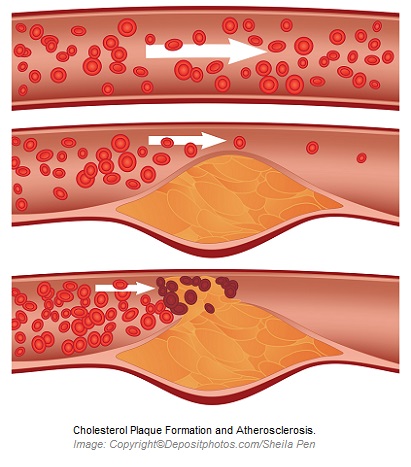Atherosclerosis is hardening of the arteries. It usually involves large and medium-sized  arteries such as the aorta, and its branches, the coronary arteries, and the large vessels of the brain. The coronary arteries are the most commonly affected arteries. Atherosclerosis typically begins as an insidious and silent process. The signs and symptoms become evident few years later.
arteries such as the aorta, and its branches, the coronary arteries, and the large vessels of the brain. The coronary arteries are the most commonly affected arteries. Atherosclerosis typically begins as an insidious and silent process. The signs and symptoms become evident few years later.
Atherosclerosis of the coronary artery (or arteries) causes ischemic heart disease (IHD). It is a condition in which there is an inadequate supply of blood and oxygen to the heart. IHD may demonstrate itself as stable angina, unstable angina, or myocardial infarction (heart attack).
Stable angina is due to a transient decrease of blood and oxygen to the heart. Patients with stable angina complain of episodes of chest discomfort described as heaviness, squeezing, smothering or pressure. Frank pain is rare. The discomfort lasts 2 to 5 minutes and can radiate to either shoulder and to both arms.
Unstable angina occurs at rest or with minimal exertion, and usually lasts more than 10 minutes. It is more severe, prolonged, and frequent than stable angina.
Acute myocardial infarction (heart attack) is characterized by severe chest pain, which is deep and visceral. It is heavy, squeezing, and crushing. Sometimes it is described as stabbing or burning. The pain radiates to the arms and jaw and is often associated with weakness, sweating, nausea, vomiting, and a sense of impending doom.
The heart diseases are the leading cause of death throughout the world, with coronary heart disease being the most common form of heart diseases.
The exact cause or causes of atherosclerosis have not been determined yet. However, recent studies show that chronic inflammation in the blood vessels could be the major contributing factor.
Potential risk factors for developing atherosclerosis are:
- Age.
- Family history.
- Smoking.
- High blood pressure.
- High level of bad cholesterol (LDL).
- Diabetes.
- Nutritional deficiencies (especially essential fatty acids, vitamin B6 and iodine).
- Obesity.
- Oxidative stress.
- Heavy metals.
- Sedentary life style.
- Elevated levels of CRP (C-reactive protein), homocysteine, triglyceride, and uric acid.
Nutritional Supports:
Restricted Foods:
- Saturated fats: all animal based fats and oils except fish.
- Foods high in trans-fat: fries, cookies, chips, muffins, doughnuts, pastries, cakes and crackers.
- Hydrogenated oils.
- Processed foods.
- Egg yolk.
- Sugars and sweets.
- Too much salt.
Recommended Foods:
- Whole grains.
- Legumes.
- Foods high in fiber.
- Fresh fruits and vegetables.
- Fruits high in flavonoids: berries.
- Red grapes. It contains a heart-protecting antioxidant called “resveratrol”.
- Green vegetables.
- Garlic.
- Onions.
- Cold water fish: salmon, halibut, and mackerel.
- Nuts, especially walnuts.
- Avocado.
- Flaxseeds.
- Chai seeds.
- Hemp seeds.
- Spices: turmeric, sumac, and cinnamon.
- Green teas.
- Cayenne pepper.
- Red wine.
Recommended Supplements:
- Co – Enzyme Q10: 100 – 300 mg a day.
- Omega – 3 Fatty Acid: 1 – 3 grams a day.
- Resveratrol: 200 – 600 mg a day.
- French Maritime Pine Bark Extract: 100 – 200 mg a day.
- Grape Seed Extract: 50 – 100 mg a day.
- L – Carnitine: 2000 – 3000 mg a day.
- Garlic Pills: 500 – 1000 mg a day.
- Magnesium: 200 – 400 mg a day.
- Vitamin B – Complex: A high potency product.
- Vitamin C: 2 – 3 grams day.
- Vitamin E: 400 – 800 IU a day.
Miscellaneous Suggestions:
- Liver detoxification.
- Colon cleansing.
- Regular exercise, especially aerobic.

